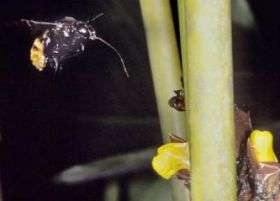The cost of long tongues

Orchid bees use their extraordinarily long tongues to drink nectar from the deep, tropical flowers only they can access. Researchers have long suspected that this kind of exclusive access came with a mechanical cost.
According to common sense and a classic law of fluid mechanics, it's just plain hard to suck thick, viscous nectars up through a long straw. Now, Brendan Borrell at the University of California, Berkeley has confirmed this prediction for the first time: orchid bees with long tongues suck up their nectars more slowly than bees with shorter tongues.
Borrell spent three years collecting bees in forests all over Costa Rica and Panama and measuring their feeding rates at artificial flowers. He found that the smallest bees sometimes had the longest tongues and the largest bees sometimes had the shortest tongues. But after taking into account all that variation in body size, he says long tongues really do impose a mechanical cost on bees.
Everyone knows just how busy bees can be, but orchid bees are basically sacrificing speed at flowers for exclusive access to them. Borrell thinks this may be because the rewards at these flowers can be tremendous, up to ten times the quanity of nectar provided by typical bee flowers.
Source: University of Chicago
















